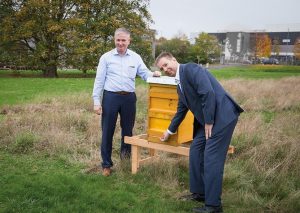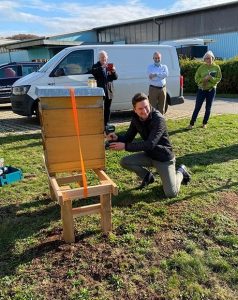
Romaco has just settled three bee colonies at its plants in Karlsruhe, Cologne, and Steinen. Up to 150,000 honey bees in total will be properly cared for at the three sites by beefuture. The project underlines the commitment of the supplier of processing and packaging equipment to the conservation of natural habitats.
According to the company, in the future, Romaco will be supported by animal workers. Just in time before the winter break, three bee colonies have moved in at the pharmaceutical machinery manufacturer. By summer next year, the bee population at Romaco Pharmatechnik in Karlsruhe, Romaco Kilian in Cologne, and Romaco Innojet in Steinen will have increased to as many as 150,000. The hives were installed in meadow areas on the factory premises, close to Romaco employees’ workplace.

This nature conservation project is the outcome of Romaco’s cooperation with the beefuture of Weissenhorn in southern Germany. The Swabian company has been deeply involved in activities to ensure honey bees’ survival since 2015, for example, by arranging hive sponsorships for local communities, public authorities, private individuals, and partner firms in Germany and other central European countries. beefuture ensures that the bees are properly cared for – amongst other things, by taking over all the beekeeping work and seeing to official permits and registrations.
“By collaborating with beefuture in this way, we’re able to make a contribution to preserving local bee populations even though we’re no experts,” emphasizes Andreas Detmers, the Romaco Group’s Sustainability Officer. “The bee project is a good example of how businesses can make a sustainable commitment to conserving natural habitats and at the same time add a new product, namely honey, to their portfolio with little effort or expense.”

The first Romaco honey should be ready for harvesting at the end of July 2021. This natural product will be collected manually and then distributed to customers and employees. To make one average-sized jar of honey, bees fly about 150,000 kilometers and visit around five million flowers, which they also pollinate. Approximately 80% of all native flowering plants rely on insects’ pollination, including agricultural commodities like apples, pears, and pumpkins. Despite this, the insect count has been in worldwide decline for several decades now, and biodiversity, too, is decreasing. In Germany, the total number of terrestrial insects in some habitats has dwindled by well over 60% during the last decade, it said.
“More than 60% drop has likewise been observed in Germany’s bee populations compared to the situation in the sixties”, explains Frank Weiß, founder of beefuture. “It’s a dramatic development that’s having alarming impacts on our ecosystem as well as on the global food chain.” Agricultural monocultures, pesticides, diseases, and climate change are regarded as the principal causes of bee mortality. “By keeping bees, we’re actively helping to ensure the survival of these endangered livestock,” Andreas Detmers reports. “For Romaco, the bee initiative represents another small step towards more corporate sustainability.”
Romaco Group’s sustainability strategy
Early in October this year, the Romaco Group’s management adopted an official sustainability strategy and defined climate targets for the period up until 2030. The pharmaceutical machinery manufacturer is already in a position today to supply customers with climate-neutral tablet presses, blister lines, and cartoners. The CO2 emissions which are released while building these machines are offset by sponsoring a climate protection project.
The aim is for the energy consumption of all Romaco machines to be reduced by up to 30% by the year 2030. There are also plans to increase the share of components, either recyclable or made from recycled material, to 70%. In its efforts to realize these sustainability goals, Romaco is guided by the principle “avoidance is better than reduction is better than compensation.”
Romaco is a leading international supplier of processing and packaging equipment specializing in engineering technologies for pharmaceutical solids. The group provides individual machines and turnkey solutions for manufacturing and packing powders, granulates, pellets, tablets, capsules, syringes, and medical devices. The company also serves the food and chemical industries. Through its various technologies, Romaco is committed to sustainable production and to systematically reducing CO2 emissions.
The Romaco Group has its headquarters in Karlsruhe (Germany) and is part of the Truking Group, a globally operating high-tech enterprise based in Changsha (China). Truking’s core competency is handling and filling pharmaceutical liquids.
Romaco operates from four European business sites, with a broad portfolio comprised of six established product brands. Noack and Siebler (Karlsruhe, Germany) supply blister, heat-sealing, and rigid tube filling machines. Macofar (Bologna, Italy) markets technologies for filling sterile and non-sterile powders and liquids. Promatic (also Bologna, Italy) specializes in cartoners, track and trace systems, and case packers. Kilian (Cologne, Germany) offers compression solutions for tableting, while Innojet (Steinen, Germany) is an innovation leader for granulation and coating.










